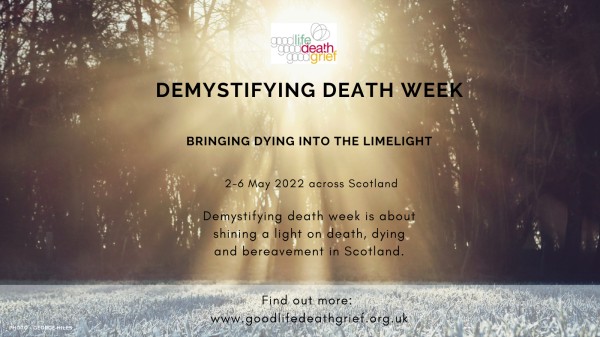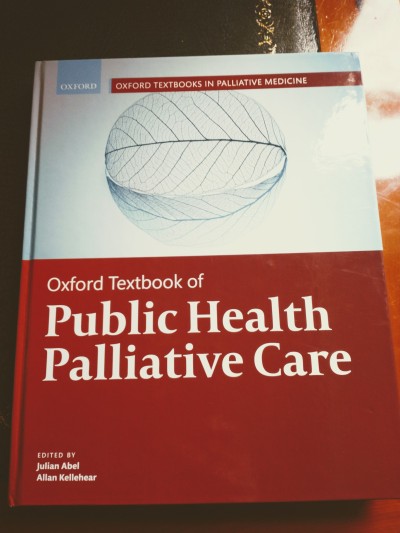News
Time to Demystify Death

Demystifying Death Week is underway (2-6 May), shining a light on death, dying and bereavement in Scotland.
Why?
People usually want to do the right thing when someone they know is caring, dying or grieving. But often they can feel awkward offering help, or worry about making things worse.
People can have questions about serious illness or death. But often they don't know who to ask.
Making plans when you’re healthy means there is less to think about when you’re ill. But often people put off making plans until it is too late.
Demystifying Death week is about giving people knowledge, skills and opportunities to plan and support each other through death, dying, loss and care.
Good Life, Good Death, Good Grief
The week was initiated by Good Life, Good Death, Good Grief – a charity-led collaboration of more than 1000 individuals and organisations that want Scotland to be a place where people can be open about and plan for death, dying and bereavement.
“If people know a bit more about death and dying, they’re in a better position to take control of their own situation, support others, make plans and have informed decisions about what they’d want when the time comes.” said Rebecca Patterson, Director of Good Life, Good Death, Good Grief.
“Sometimes people worry about things, like what to say to someone who’s been bereaved, or being refused CPR. Perhaps having more information about these could help people worry less.
“There are lots of resources out there that provide information, but sometimes it is difficult to know where to look. We want to make this information easier for people to get at, and we’ll be sharing a lot of it this week using the hashtag #DemystifyDeath.”
This will include information on the kinds of preparations people can make if they are worried their health may get worse, for example by making a Power of Attorney and talking to the people close to them about an anticipatory care plan. They will also be sharing tips on how ordinary people can provide informal support to a friend or family member who is caring, dying or grieving, and places people can go for more formal support.
New resources
The 3rd May will see the launch of a suite of resources to help workplaces become more ‘bereavement-friendly. The new resources were produced by the Scottish Bereavement Charter Group, and Good Life, Good Death, Good Grief, and include:
- A Bereavement-Friendly Workplaces Toolkit with information to help employers develop helpful workplace practices relating to bereavement.
- A Charter Mark that gives recognition to employers working to become more bereavement-friendly.
- An Employer’s Guide to the Bereavement Charter.
- A leaflet ‘What to do when a colleague has been bereaved’.
- A checklist of ‘things to do’ to become a bereavement-friendly workplace.
Events
Various online and face-to-face events are taking place during the week, for example, in Dundee Coffin Club Caledonia Dundee will hold evening sessions providing a safe space to allow people to learn about and to discuss their options surrounding their end-of-life decisions and funeral planning. Battlefield Community Project in Glasgow invite members of the community to participate in creating a memorial strawberry patch. NHS Greater Glasgow & Clyde are holding a week-long programme of online events for staff and members of the public covering topics from preparing for hospital to making a Will.
A full list of events is available here: DD Week 2022 Events Listing
“We’re often told that death is a ‘taboo’ – something that people don’t want to talk about.’ said Rebecca Patterson, Director of GLGDGG. ‘But surveys show that in Scotland most people are actually fairly comfortable talking about death. Perhaps the right opportunities just don’t present themselves. Demystifying Death week is a chance to open up about death, air these topics and become a bit better at supporting each other through these difficult times.”
Launch of new book on Public Health Palliative Care

Experts from across the world have come together to develop the first ever Oxford Textbook of Public Health Palliative Care.
The new textbook is a comprehensive exploration of the idea that, though health and social care services are important, there are many equally important influences on people's experiences of death, dying, loss and care. Public health palliative care’ is a term used to encompass a variety of approaches that involve working with communities and wider society to improve people’s experience of death, dying and bereavement.
Contributions from Scotland include a chapter by Dr Sally Paul (Strathclyde University) on Public Health Palliative Care Education: Children and Schools; and a chapter by Rebecca Patterson and Mark Hazelwood (Scottish Partnership for Palliative Care) exploring Developing End of LIfe Literacy Through Public Education.
The textbook explores the role of 'new' public health, or health promotion, as the basis for the development of public health palliative care, looking beyond the traditional symptom-focused view of palliative care to emphasise the crucial roles of culture and community in death, dying, loss and caregiving.
The new book aims to be comprehensive in scope, covering the need for a public health approach to palliative care, basic theory and concepts, practice methods, population-based approaches, and research and education.
All are invited to attend one of the free online launch events:
Oxford Textbook of Palliative Medicine online launch event 11th May.
Oxford Textbook of Palliative Medicine online launch event 12th May
The new textbook was edited by Julian Abel and Allan Kellehear and is available to purchase from Oxford University Press.
Get ready for Demystifying Death Week
Taking place across Scotland from 2-6 May, Demystifying Death Week is about shining a light on death, dying and bereavement in Scotland. We are encouraging people to get involved by holding events that bring death, dying and bereavement into the limelight. This year, there is a special focus on grief in the workplace.
why?

People usually want to do the right thing when someone they know is caring, dying or grieving. But often they can feel awkward offering help, or worry about making things worse.
People often have questions about serious illness or death. But often they don't know who to ask.
Making plans when you’re healthy means there is less to think about when you’re ill. But often people put off making plans until it is too late.
Demystifying Death week is about giving people knowledge, skills and opportunities to plan and support each other through death, dying, loss and care.
background

Since the first death awareness week back in 2013, each May, people across Scotland have organised local events giving people the chance to talk about death, dying and bereavement.
Hospices, community groups, NHS and arts organisations have organised a range of events including death cafes, pebble painting, exhibitions, information stands, film showings, discussion groups and much more.
grief in the workplace
This year we’re making a special effort to shine a light on grief in the workplace.
No-one can take away the pain of grief. But a supportive workplace can make things a little bit easier to deal with.

On the other hand, insensitive treatment from an employer, line-manager or colleague can make bereavement experiences even more distressing.
For Demystifying Death Week this year we’re launching a suite of resources to help managers, employers and colleagues create more compassionate workplaces for people who have been bereaved.
Find out more and get involved.
events and small grants
Would you like to be involved with this year's Demystifying Death Week? We have lots of resources to help people put on events, including a small grants scheme.
Find out more and get involved.
Demystifying Death Small Grants

Demystifying death week is about shining a light on death, dying and bereavement in scotland.
Taking place across Scotland from 2-6 May, the week is about giving people knowledge, skills and opportunities to plan and support each other through death, dying, loss and care.
A small grants scheme has been launched to help people run events, whether face-to-face or online.
The grants (of up to £100) can be applied for to fund activities that take place in DD Week that meet one or more of the following aims:
- Help people to find ways of dealing with their own experiences of death, dying and bereavement;
- Help individuals and communities to support those who are experiencing difficult times associated with death, dying and bereavement;
- Support NHS and social care staff and volunteers to work compassionately and constructively with those who are dying or have been recently bereaved;
- Help people to make practical preparations for their death, for example Will, Power of Attorney and Anticipatory Care Planning;
- Promote openness/discussion of death, dying and bereavement.
For instance, someone might want to host a cafe-style event using one of our conversation menus and need the grant to get some refreshments. Or an organisation could arrange a local solicitor or funeral director to run an information session on planning for the end of life and need the grant to hire a room. We're open to all ideas.
Further resources and ideas relating to DD Week events is available here: Organise an event.
If you'd like to apply for a small grant, more information and an application form are available here:
Please e-mail the application form to susan@palliativecarescotland.org.uk by Monday 28 March 2022.
More information about Demystifying Death Week is available here: Demystifying Death Week.
Photo credit: Visual Stories || Micheile on Unsplash
Truacanta Project - latest updates

The Truacanta Project is supporting local communities across Scotland who are interested in taking community action to improve people’s experiences of death, dying, loss and care.
The Truacanta Project is an initiative run by the Scottish Partnership for Palliative Care, and funded by Macmillan Cancer Support.
This blog shares the latest updates from the five Truacanta communities, in Highland, North Berwick, Dundee, Perthshire and Ayrshire.